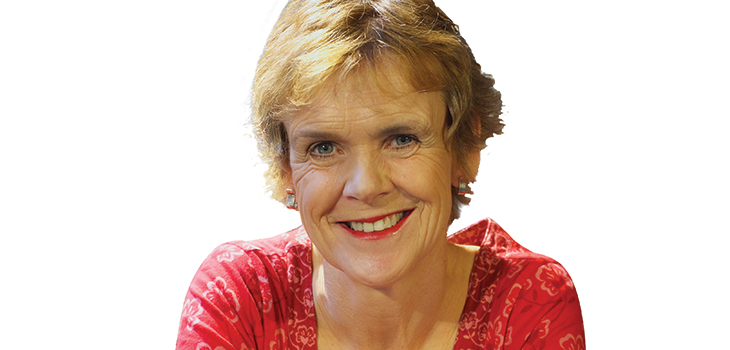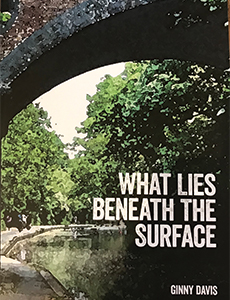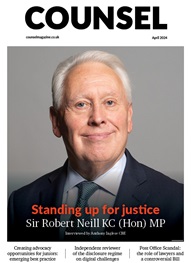*/

It was 1989. I was about to take the Bar Final exam. He was a barrister and we drove through Birmingham with Supertramp’s Breakfast in America blaring out of the car radio that we’d hidden under the seat while we were in the restaurant in case it got nicked. The journey lasted the length of most of the remaining tracks on the album. They filled our souls with happiness and, hearts filled with love, in 1990 we were married.
We were lucky. In the words of poet Andrew Marvell, we had both ‘world enough and time’. The barrister later took silk, became a Circuit judge, Recorder of Birmingham, then a High Court judge. I was a criminal barrister and might have continued after having children but that option was even more difficult than it is today. I became a full-time mother, then deployed my barrister’s toolkit to writing and performing for theatre. Now I’m a novelist.
Musically, we brought separate baggage. His was Joni Mitchell and Bach’s cello concertos. Mine, The Pet Shop Boys and choral music. The two choral pieces I’ll take to my desert island will be those I memorised as a member of the City of Birmingham Choir: Handel’s Messiah and Elgar’s Dream of Gerontius. Come unto Him, the soprano aria from Messiah, transports me to the terrifying, characterless room in which I sang it as my audition piece for the choir. Whenever I hear it, I recall my own breathless rendition with grotesque embarrassment. I first heard Gerontius from a record player in a terraced house near the Birmingham Oratory where the original score is held. It was written in Malvern, close to my school and the hills which lowered over it.
Every year the Welsh National Opera came to the Birmingham Hippodrome. I’d told the barrister I later married that I hated opera. He bought tickets anyway. Gradually I became a convert and, although I haven’t achieved sophisticated tastes, I am moved to sigh in peaceful contentment at the beauty of Soave Sia Il Vento from Mozart’s Cosi Fan Tutti. For years I had no idea what the words meant, so I learned Italian and realised that Mozart had some pretty tart things to say about women, to sublime accompaniment.
There is a relatively obscure song called Kiss Me by Sixpence None The Richer. In 2008 I took my first one-woman play to the Edinburgh Fringe. My space in Surgeon’s Hall, Teviot Place sat 46 people if you brought in extra chairs. Kiss Me was the play-in music, inseparably linked to my memory of standing in the wings, fuelled by adrenalin, listening to the audience assembling, gauging their mood and hearing the front of house staff bring in extra seats every day for what became a sell-out show. It set me up to become a full-time writer and performer for theatre.
Back to poetry. Amanda Gorman’s The Hill We Climb, the poem she wrote for Biden’s inauguration, is inspirational – all the more so for having been written by someone so young. Surely it is incumbent on society not to shatter the dream of the girl who in 2021 writes: ‘For there is always light / If only we’re brave enough to see it / If only we’re brave enough to be it.’ Her poem references Lin-Manuel Miranda’s Hamilton, an amazing piece of musical theatre in which everything comes together in brilliance.
Theatre is my passion: London Road – a piece so challenging that cast members were reduced to tears in rehearsal; Othello starring Rory Kinnear and Adrian Lester; any production my son Ralph, a professional actor, has been in; Lear at the Globe; Tamburlaine and Timon at the RST; and Lehman Brothers – remarkable.
In 2020 I took up running during breaks from writing my novel, which is partly set on Regent’s Canal and features the death of a homeless man. When I completed the novel I ran the length of the canal as a fundraiser for St Mungo’s homeless charity. Runners often listen to music. I listen to novels. I’d always been a bit of a snob about audiobooks, but now I have absorbed more literature through this medium than I could have achieved through reading. My desert island storytellers are Lionel Shriver for her wit and intelligence, Edith Wharton for her descriptive skill. There are many more titles to list: American Dirt, Where The Crawdads Sing, City of Girls, Water for Elephants. I have lost myself in all of these worlds and emerged, always enriched.
What can’t I live without? Toffees.


It was 1989. I was about to take the Bar Final exam. He was a barrister and we drove through Birmingham with Supertramp’s Breakfast in America blaring out of the car radio that we’d hidden under the seat while we were in the restaurant in case it got nicked. The journey lasted the length of most of the remaining tracks on the album. They filled our souls with happiness and, hearts filled with love, in 1990 we were married.
We were lucky. In the words of poet Andrew Marvell, we had both ‘world enough and time’. The barrister later took silk, became a Circuit judge, Recorder of Birmingham, then a High Court judge. I was a criminal barrister and might have continued after having children but that option was even more difficult than it is today. I became a full-time mother, then deployed my barrister’s toolkit to writing and performing for theatre. Now I’m a novelist.
Musically, we brought separate baggage. His was Joni Mitchell and Bach’s cello concertos. Mine, The Pet Shop Boys and choral music. The two choral pieces I’ll take to my desert island will be those I memorised as a member of the City of Birmingham Choir: Handel’s Messiah and Elgar’s Dream of Gerontius. Come unto Him, the soprano aria from Messiah, transports me to the terrifying, characterless room in which I sang it as my audition piece for the choir. Whenever I hear it, I recall my own breathless rendition with grotesque embarrassment. I first heard Gerontius from a record player in a terraced house near the Birmingham Oratory where the original score is held. It was written in Malvern, close to my school and the hills which lowered over it.
Every year the Welsh National Opera came to the Birmingham Hippodrome. I’d told the barrister I later married that I hated opera. He bought tickets anyway. Gradually I became a convert and, although I haven’t achieved sophisticated tastes, I am moved to sigh in peaceful contentment at the beauty of Soave Sia Il Vento from Mozart’s Cosi Fan Tutti. For years I had no idea what the words meant, so I learned Italian and realised that Mozart had some pretty tart things to say about women, to sublime accompaniment.
There is a relatively obscure song called Kiss Me by Sixpence None The Richer. In 2008 I took my first one-woman play to the Edinburgh Fringe. My space in Surgeon’s Hall, Teviot Place sat 46 people if you brought in extra chairs. Kiss Me was the play-in music, inseparably linked to my memory of standing in the wings, fuelled by adrenalin, listening to the audience assembling, gauging their mood and hearing the front of house staff bring in extra seats every day for what became a sell-out show. It set me up to become a full-time writer and performer for theatre.
Back to poetry. Amanda Gorman’s The Hill We Climb, the poem she wrote for Biden’s inauguration, is inspirational – all the more so for having been written by someone so young. Surely it is incumbent on society not to shatter the dream of the girl who in 2021 writes: ‘For there is always light / If only we’re brave enough to see it / If only we’re brave enough to be it.’ Her poem references Lin-Manuel Miranda’s Hamilton, an amazing piece of musical theatre in which everything comes together in brilliance.
Theatre is my passion: London Road – a piece so challenging that cast members were reduced to tears in rehearsal; Othello starring Rory Kinnear and Adrian Lester; any production my son Ralph, a professional actor, has been in; Lear at the Globe; Tamburlaine and Timon at the RST; and Lehman Brothers – remarkable.
In 2020 I took up running during breaks from writing my novel, which is partly set on Regent’s Canal and features the death of a homeless man. When I completed the novel I ran the length of the canal as a fundraiser for St Mungo’s homeless charity. Runners often listen to music. I listen to novels. I’d always been a bit of a snob about audiobooks, but now I have absorbed more literature through this medium than I could have achieved through reading. My desert island storytellers are Lionel Shriver for her wit and intelligence, Edith Wharton for her descriptive skill. There are many more titles to list: American Dirt, Where The Crawdads Sing, City of Girls, Water for Elephants. I have lost myself in all of these worlds and emerged, always enriched.
What can’t I live without? Toffees.



Sam Townend KC explains the Bar Council’s efforts towards ensuring a bright future for the profession
Giovanni D’Avola explores the issue of over-citation of unreported cases and the ‘added value’ elements of a law report
Louise Crush explores the key points and opportunities for tax efficiency
Westgate Wealth Management Ltd is a Partner Practice of FTSE 100 company St. James’s Place – one of the top UK Wealth Management firms. We offer a holistic service of distinct quality, integrity, and excellence with the aim to build a professional and valuable relationship with our clients, helping to provide them with security now, prosperity in the future and the highest standard of service in all of our dealings.
Is now the time to review your financial position, having reached a career milestone? asks Louise Crush
If you were to host a dinner party with 10 guests, and you asked them to explain what financial planning is and how it differs to financial advice, you’d receive 10 different answers. The variety of answers highlights the ongoing need to clarify and promote the value of financial planning.
Most of us like to think we would risk our career in order to meet our ethical obligations, so why have so many lawyers failed to hold the line? asks Flora Page
If your current practice environment is bringing you down, seek a new one. However daunting the change, it will be worth it, says Anon Barrister
Creating advocacy opportunities for juniors is now the expectation but not always easy to put into effect. Tom Mitcheson KC distils developing best practice from the Patents Court initiative already bearing fruit
Sam Townend KC explains the Bar Council’s efforts towards ensuring a bright future for the profession
National courts are now running the bulk of the world’s war crimes cases and corporate prosecutions are part of this growing trend, reports Chris Stephen